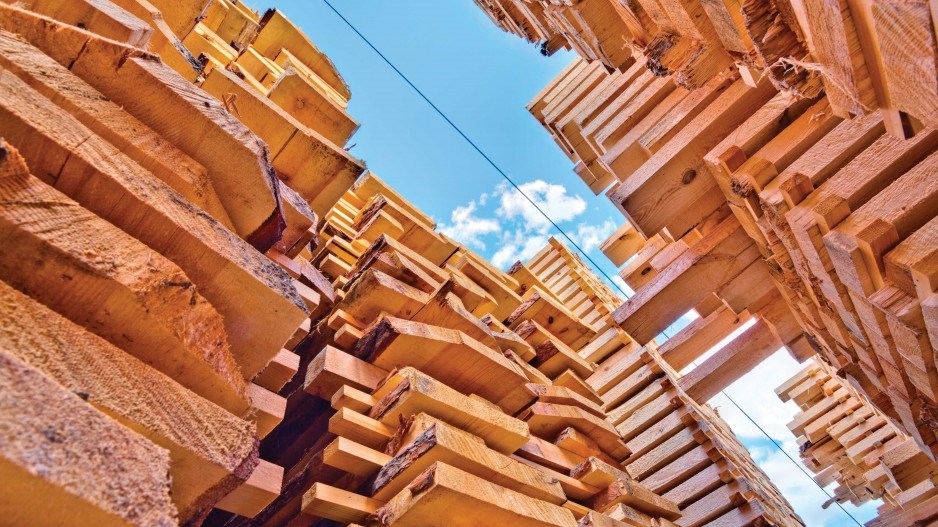The Canada-U.S. Softwood Lumber Agreement (SLA) expires on October 12, nine years after it was last renewed.
When it does, Canadian lumber producers will have an advantage in the American market because the duties they now pay will be gone and they will be getting $0.25 on the dollar more for their lumber, thanks to the weak Canadian dollar.
That’s just the sort of advantage that irritates American producers, who have a history of lobbying for – and getting – countervailing duties against Canadian lumber.
With American and Canadian governments more focused on the Trans-Pacific Partnership (TPP) agreement – which could have serious consequences for the coastal forest industry, according to one industry analyst – there appears to be little urgency on either side of the border to renew the SLA, according to a new Canada West Foundation report.
Given the toll the softwood lumber disputes with the U.S. have taken on B.C. in the past – 6,000 sawmill layoffs and $5 billion in penalties levied against B.C. producers – America’s apparent indifference toward renewing the agreement might normally cause some hand-wringing in B.C.
But a lot has changed in the decade since the last softwood lumber war was waged.
With the addition of China as a customer, B.C.’s lumber export market has become more diversified. Canada’s share of the American lumber market has also shrunk from 30% to 27% and is predicted to drop to 25% by 2027, according to Branching Out.
In B.C., a shrinking timber supply – thanks to the mountain pine beetle infestation – is expected to push prices for B.C. lumber higher over the long term, making it tougher for American producers to accuse Canada of dumping cheap wood into the U.S.
There’s also this: B.C.’s three biggest forestry companies now own more sawmills in the U.S. than they do in Canada.
Even so, the Canada West Foundation’s Branching Out report warns there are still risks that Canadian lumber producers could be hit by American countervailing duties.
“While there’s not the same panic as there was a decade ago, it is important for Canada to be thinking about what to do to maintain a strong industry if we don’t get another agreement,” Branching Out author Naomi Christensen told Business in Vancouver.
The report states that, because the U.S. government appears to have little interest in renewing the SLA, Canada needs some new trade strategy to guard against potential protectionism.
It recommends increased diversification of markets for Canadian lumber in South Korea and Mexico and exploring new markets in Asia within the TPP.
While greater diversification is always good, Russell Taylor, CEO of International Wood Markets Group, said the reality is that the U.S. has always been Canada’s biggest customer and always will be because no other major lumber-producing country can sell lumber to the U.S. as cheaply or easily as Canada can.
“Market diversification is important, but it’s a bit of a backup plan to a weaker U.S. market,” he said. “Our mills are designed to produce lumber for the U.S. market. We’ve designed our technology to produce two-by-fours, and that’s not the size that the rest of the world wants.”
During the housing market crash in the U.S., China provided a lifeline to B.C. producers, who capitalized on a construction boom in China to sell cheap lumber for construction framing – demand that has since plateaued.
“The only reason we were competitive in China is because we had a lot of mountain-pine-beetle-killed wood that nobody else would take and China would. They use it a few times and throw it away. And that’s what you’re calling market diversification.”
In other words, like it or not, B.C.’s forestry industry will always be dependent on the U.S., so there will always be trade disputes.
Whereas most of the timber harvested in the U.S. is from private land, most of the logs harvested in Canada come from Crown land. American producers argue that the Crown tenure system is a form of subsidy that warrants protectionist measures.
When the North American Free Trade Agreement (NAFTA) was signed with the U.S. and Mexico, Canada insisted on excluding softwood lumber, which is why it has had to be dealt with in a separate agreement.
As the Canada West Foundation report points out, Western Canada accounts for 74% of Canada’s exports of softwood lumber to the U.S., so B.C. has always been the biggest target for countervailing duties. But as B.C.’s timber supply shrinks over the long term, it is expected that B.C. producers will no longer be able to produce lumber as cheaply as they have in the past, which might mitigate the call for countervailing duties.
B.C.’s shrinking timber supply has sent its three largest forestry companies on a buying spree in the U.S.
West Fraser Timber Co. Ltd. (TSX:WTF), Interfor Corp. (TSX:IFP) and Canfor Corp. (TSX:CFP) now own 35 sawmills in the U.S., according to Branching Out. That’s more than they own in Canada, and it provides a hedge against countervailing duties, because the lumber their American mills produce would not be subject to duties. But an even greater threat to B.C.’s forestry sector might be the removal of restrictions on raw log exports under the TPP, not the lack of a new softwood lumber agreement.
The TPP talks have been highly secretive. However, in July, documents leaked to the Canadian Press indicated Japan is lobbying to have the current restriction on raw log exports removed.
B.C. mills have the first right of refusal before logs harvested on the B.C. coast – mostly from private forest land owned by TimberWest and Island Timberlands – can be exported.
If Japan succeeds in having those restrictions removed, and if China were also granted access to an unrestricted log market, Taylor said, “we would see the coastal sawmilling industry almost disappear.”




